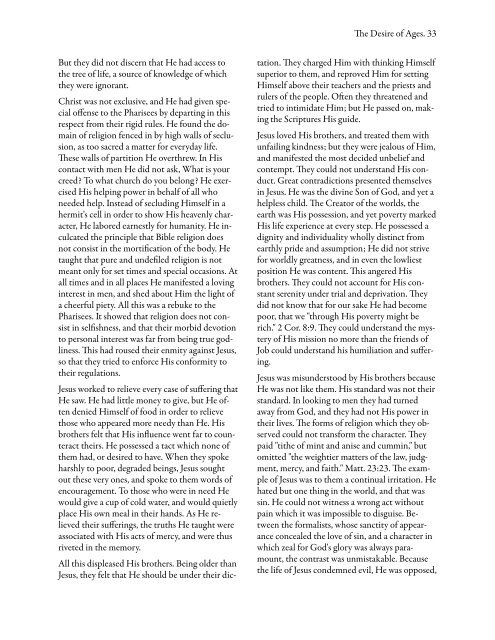The Desire of Ages - Christian Freebies
The Desire of Ages - Christian Freebies
The Desire of Ages - Christian Freebies
Create successful ePaper yourself
Turn your PDF publications into a flip-book with our unique Google optimized e-Paper software.
But they did not discern that He had access to<br />
the tree <strong>of</strong> life, a source <strong>of</strong> knowledge <strong>of</strong> which<br />
they were ignorant.<br />
Christ was not exclusive, and He had given special<br />
oense to the Pharisees by departing in this<br />
respect from their rigid rules. He found the domain<br />
<strong>of</strong> religion fenced in by high walls <strong>of</strong> seclusion,<br />
as too sacred a matter for everyday life.<br />
ese walls <strong>of</strong> partition He overthrew. In His<br />
contact with men He did not ask, What is your<br />
creed? To what church do you belong? He exercised<br />
His helping power in behalf <strong>of</strong> all who<br />
needed help. Instead <strong>of</strong> secluding Himself in a<br />
hermit's cell in order to show His heavenly character,<br />
He labored earnestly for humanity. He inculcated<br />
the principle that Bible religion does<br />
not consist in the mortication <strong>of</strong> the body. He<br />
taught that pure and undeled religion is not<br />
meant only for set times and special occasions. At<br />
all times and in all places He manifested a loving<br />
interest in men, and shed about Him the light <strong>of</strong><br />
a cheerful piety. All this was a rebuke to the<br />
Pharisees. It showed that religion does not consist<br />
in selshness, and that their morbid devotion<br />
to personal interest was far from being true godliness.<br />
is had roused their enmity against Jesus,<br />
so that they tried to enforce His conformity to<br />
their regulations.<br />
Jesus worked to relieve every case <strong>of</strong> suering that<br />
He saw. He had little money to give, but He <strong>of</strong>ten<br />
denied Himself <strong>of</strong> food in order to relieve<br />
those who appeared more needy than He. His<br />
brothers felt that His inuence went far to counteract<br />
theirs. He possessed a tact which none <strong>of</strong><br />
them had, or desired to have. When they spoke<br />
harshly to poor, degraded beings, Jesus sought<br />
out these very ones, and spoke to them words <strong>of</strong><br />
encouragement. To those who were in need He<br />
would give a cup <strong>of</strong> cold water, and would quietly<br />
place His own meal in their hands. As He relieved<br />
their suerings, the truths He taught were<br />
associated with His acts <strong>of</strong> mercy, and were thus<br />
riveted in the memory.<br />
All this displeased His brothers. Being older than<br />
Jesus, they felt that He should be under their dic-<br />
e <strong>Desire</strong> <strong>of</strong> <strong>Ages</strong>. 33<br />
tation. ey charged Him with thinking Himself<br />
superior to them, and reproved Him for setting<br />
Himself above their teachers and the priests and<br />
rulers <strong>of</strong> the people. Oen they threatened and<br />
tried to intimidate Him; but He passed on, making<br />
the Scriptures His guide.<br />
Jesus loved His brothers, and treated them with<br />
unfailing kindness; but they were jealous <strong>of</strong> Him,<br />
and manifested the most decided unbelief and<br />
contempt. ey could not understand His conduct.<br />
Great contradictions presented themselves<br />
in Jesus. He was the divine Son <strong>of</strong> God, and yet a<br />
helpless child. e Creator <strong>of</strong> the worlds, the<br />
earth was His possession, and yet poverty marked<br />
His life experience at every step. He possessed a<br />
dignity and individuality wholly distinct from<br />
earthly pride and assumption; He did not strive<br />
for worldly greatness, and in even the lowliest<br />
position He was content. is angered His<br />
brothers. ey could not account for His constant<br />
serenity under trial and deprivation. ey<br />
did not know that for our sake He had become<br />
poor, that we "through His poverty might be<br />
rich." 2 Cor. 8:9. ey could understand the mystery<br />
<strong>of</strong> His mission no more than the friends <strong>of</strong><br />
Job could understand his humiliation and suering.<br />
Jesus was misunderstood by His brothers because<br />
He was not like them. His standard was not their<br />
standard. In looking to men they had turned<br />
away from God, and they had not His power in<br />
their lives. e forms <strong>of</strong> religion which they observed<br />
could not transform the character. ey<br />
paid "tithe <strong>of</strong> mint and anise and cummin," but<br />
omitted "the weightier matters <strong>of</strong> the law, judgment,<br />
mercy, and faith." Matt. 23:23. e example<br />
<strong>of</strong> Jesus was to them a continual irritation. He<br />
hated but one thing in the world, and that was<br />
sin. He could not witness a wrong act without<br />
pain which it was impossible to disguise. Between<br />
the formalists, whose sanctity <strong>of</strong> appearance<br />
concealed the love <strong>of</strong> sin, and a character in<br />
which zeal for God's glory was always paramount,<br />
the contrast was unmistakable. Because<br />
the life <strong>of</strong> Jesus condemned evil, He was opposed,


